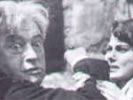Eye For Film >> Movies >> The Man Who Watched Trains Go By (1952) Film Review
The Man Who Watched Trains Go By starts out with many of the credentials of a slick, suspenseful thriller. It begins with a well-to-do provincial Dutchman, long-serving clerk to a family-run shipping company, who gradually gets drawn into his boss’s shady dealings.
The opening sets up the intrigue perfectly: Claude Rains is punctilious and brown-nosing as the clerk, Kees Popinga. His family life is as ordered and exemplary as his beloved account books, and nothing brings a fuzzy glow to his cheeks like time-keeping the express trains on his way to and from work. However, his familiar routine is unsettled by a visit from French detective Lucas (Marius Goring) whose scrutinising threatens the order of Kees’ comfortable life.

Plot-wise, the highlights of the film are in the early stages, where there’s a decent attempt at a psychological portrait of a very straight-laced man suddenly faced with a moral crisis. Kees sees red and after a compromising outburst, finds himself on a fast train to France with a briefcase full of guilder, but another chance encounter with Lucas panics him and sends him straight into the clutches of the Parisian famme fatale who destroyed his boss’s business.
There are flashes of interest through the film – like the smart scene between Kees and the detective on the train which unfolds over a tense game of chess; Anouk Aimee (La Dolce Vita, 8½ ) also has a fun cameo as a prostitute. But as it winds on, the repeated twists and turns get a bit studied and wearing. Rains’ interpretation of Kees’ fluctuating states of mind is effective at first but grows too erratic and starts to become almost buffoonish where he’s interacting with wicked woman Michele. Perhaps his cartoon-like eyebrow raising was intended to get a giggle, but it’s then hard to accept the more serious aspirations of the film. Kees is ludicrous as a homicidal maniac, the scenes in which he finally cracks are without finesse. Not content with killing off the players, Harold French has decided to bludgeon the audience as well. And what do we get for our pains? A brusque non-ending that apparently ignores most of what has gone on in the previous 75 minutes.
Comparisons with Hitchcock are inevitable here, and won't do The Man Who Watched Trains Go By any favours. If you want to see how slick, stylish suspense is really done, watch North-by-North West, or To Catch A Thief instead. Too busy watching trains, this film sadly lost the plot.
Reviewed on: 16 Jun 2008



















